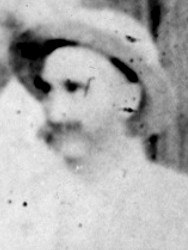Served in the presence of the enemy at the battle of Peking, China, 20 June to 16 July 1900. Assisting in the erection of barricades during the action, Fisher was killed by the heavy fire of the enemy.
(Harry Fisher was the alias used by Franklin J. Phillips, a former private in Company M, First U.S. Infantry who served in Cuba during the Spanish-American War. He deserted from Camp A. G. Forse in Huntsville, Alabama, on December 17, 1898, after contracting malaria after being refused a sick furlough. On March 6, 1899, a recruiting officer in Pittsburgh telegraphed the Adjutant General in Washington that Phillips was asking to be restored to duty. His unit had already returned to Cuba by this time. The Adjutant General’s Office issued Special Order No. 63, on March 17, 1899, ordering by direction of the Assistant Secretary of War, that Pvt. Franklin J. Philips be “discharged without honor from the service of the United States . . . by reason of desertion.” Phillips then joined the Marine Corps and served honorably under the name “Harry Fisher” until killed in action in China. The 53d Marine to receive the award, he was the first USMC POSTHUMOUS Medal of Honor recipient. Fisher’s mother wrote the Commandant of the Marine Corps, requesting that the Marine Corps rolls be changed to reflect her son’s true name. The Commandant denied this request in a May 11, 1901, letter stating that “no change can be made in a man’s record after his death.” Mrs. Means accepted her son’s Medal of Honor under the name Pvt. Harry Fisher on August 15, 1901. In 1988, after requests from several individuals from Pennsylvania including two congressman, Gen. Alfred Gray, Commandant of the Marine Corps, directed that Pvt. Harry Fisher’s records changed to show his true name, Franklin J. Phillips.)

